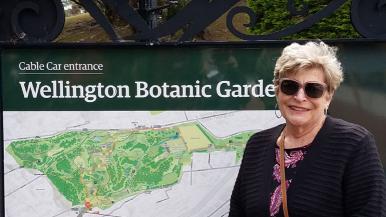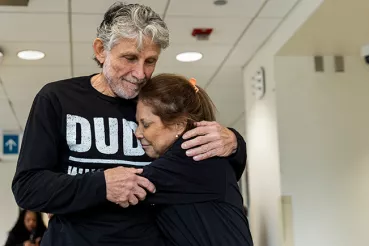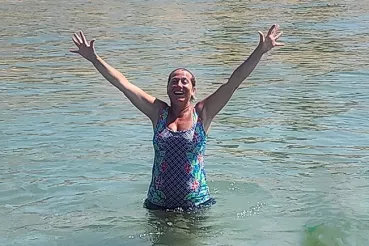After 40 years of traveling all over the world as a travel consultant/host, it’s clear that Barbara Atwater does not like to sit still. But when she was diagnosed with lung cancer, she reset her life to focus on survival — to ensure she would live to travel again.
Barbara’s relationship with Rush started in early 2018 when she was referred to thoracic surgeon Christopher Seder, MD, to treat a rare thymic cancer.
“When I first met with Dr. Seder, I was so impressed,” says Barbara. “But it wasn’t just him, there was a whole team of experts who were there to take care of me. One time, I checked in for an appointment and on my way to the waiting room, I walked by a conference room. Sure enough, I saw Dr. Seder and all these other doctors and providers around a table. He told me later that they were discussing me. That’s a good feeling. It made me feel really important and like I was going to be OK.”
After the surgery, Barbara underwent six weeks of radiation therapy and then had a PET scan of her lungs, which revealed some abnormal nodules. Seder and his team continued to monitor Barbara’s lungs, letting her know that she would likely need surgery down the road if the nodules developed into lung cancer.
Barbara was scared, but she took advantage of the wait-and-see period. She continued working and led tours to Greece, Germany, Phoenix and Oregon. “I wanted to pack it all in,” she says.
Lung cancer surgery
By October 2019, Seder let Barbara know that she would need surgery to remove a lung tumor. She remembers: “I told my daughter, ‘That’s it, I’m done.’ But Dr. Seder and his team said, ‘No, Barbara, you are not done. You can survive and still live a full life. We’re here for you and we’ll work with you.’”
During the surgery, Seder removed about one-third of Barbara’s left lung, leaving her cancer-free without a need for chemotherapy or radiation therapy. She was, however, in pain and extremely weak, which is to be expected after this type of surgery.
Her care team was with her every step of the way, managing her pain and guiding her through her recovery.
“Every time I contacted them through MyChart or with a phone call, they got back to me right away,” she says. “I must have contacted them every other day for weeks after the surgery. And every time, they called me right back, calmed me down and addressed my concerns. They also reminded me that this was major surgery and that it would take time to heal.”
The road to recovery
Barbara’s care team also enrolled her in the pulmonary rehabilitation program at Rush Oak Park Hospital to help her regain her strength and improve her lung function.
The six- to eight-week program helped Barbara turn the corner in her recovery. “When I first walked into the pulmonary rehab suite at Rush Oak Park, I again thought, ‘I’m done. I can’t do this,’” she says. “But low and behold, it ended up being one of the greatest experiences of my life.”
Barbara went to rehab Monday through Friday for eight weeks. “Everything I did in rehab helped me get my strength back,” she says. “It was hard, but I knew I had to work hard because I couldn’t just sit around forever. I still wanted to work and live my life.”
During rehab, Barbara focused on her exercises and re-learned how to engage her diaphragm to breathe more effectively. “The exercises started out really difficult, but they got easier as I regained my strength,” she says. “By the end of rehab, I was able to walk, my blood pressure and oxygen levels improved, and I felt really good.”
When she finished the program, she was not only physically stronger, but she felt confident and proud. “At the end of the program, my therapists in the program said, ‘Look at what you did, and what you’ve accomplished, it’s amazing and you should be proud of yourself,’ and I was,” says Barbara. “Some people may want to give up. But not me. I have a big family, and I’m not ready to say good-bye. I have a lot left to do. I want to see so many more things in the world.”
Looking forward
Today, a year after her lung cancer surgery, Barbara is still cancer-free and continues her follow-ups with Seder.
“It’s scary to call yourself a cancer survivor, but then I think to myself: I’ve made it, I did it — and that felt good,” she says. “I have been fortunate enough to have Dr. Seder and the rest of my team at Rush, my family and everyone pushing me even after I was home.”
Barbara is now even looking ahead, planning tours around the world this year once the COVID-19 pandemic ends. “I’ve learned how powerful it is to focus on the good things in your life and look out the front window rather than the rearview mirror,” she says.




